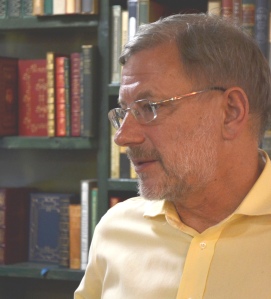 My name is Jeff Garrett. I am a born Evanstonian, the son of Northwestern parents and the father of two Northwestern graduates. After graduating from the University of Munich with a degree in linguistics and history, I worked at the International Youth Library in Munich as a language specialist for five years before returning to the US in 1988 and getting my library degree from Berkeley. I worked as a librarian at Purdue University for five years and at Northwestern for 19, retiring this past February from Northwestern as Associate University Librarian for Special Libraries. With my wife Nina, I opened Bookends & Beginnings, an independent bookstore catering to the reading needs of the Evanston community, in June 2014.
My name is Jeff Garrett. I am a born Evanstonian, the son of Northwestern parents and the father of two Northwestern graduates. After graduating from the University of Munich with a degree in linguistics and history, I worked at the International Youth Library in Munich as a language specialist for five years before returning to the US in 1988 and getting my library degree from Berkeley. I worked as a librarian at Purdue University for five years and at Northwestern for 19, retiring this past February from Northwestern as Associate University Librarian for Special Libraries. With my wife Nina, I opened Bookends & Beginnings, an independent bookstore catering to the reading needs of the Evanston community, in June 2014.
1) The Rose of Martinique: A Life of Napoleon’s Josephine by Andrea Stuart (2005)
My wife and I vacationed on Martinique in the French Antilles this year, and this book seemed like a great way to satisfy my curiosity about its (completely unknown!) history and combine it with my general interest in 18th century Europe. And I was not disappointed! The book looks at what it was like growing up Creole in the French colonies 250 years ago, gives a credible, detailed look into slave culture on the sugarcane plantations, then whisks the reader off to Paris where a young girl from the provinces goes through the Revolution, meets and then marries the most dazzling figure of the age, Napoleon Bonaparte.

